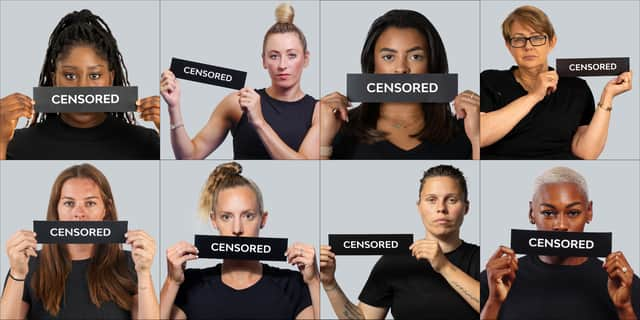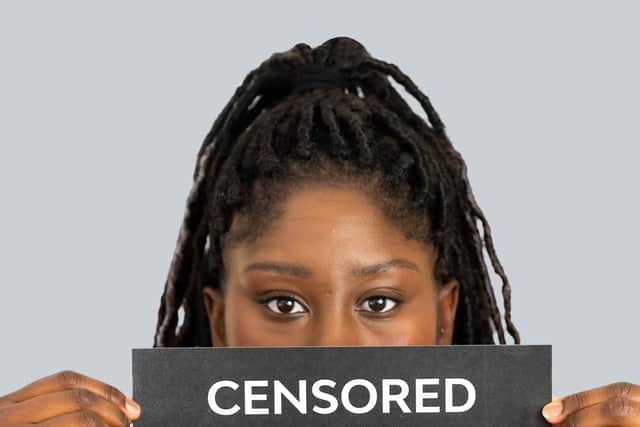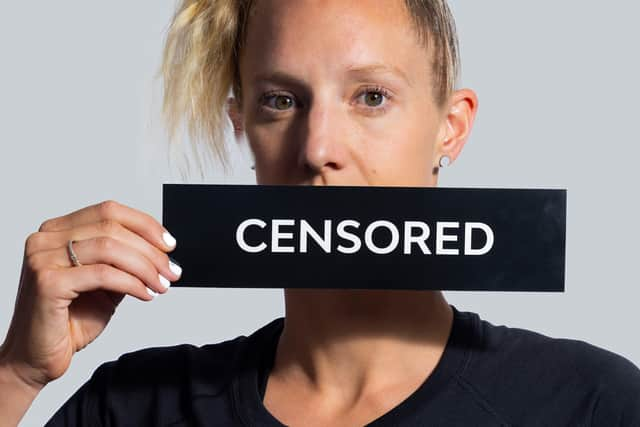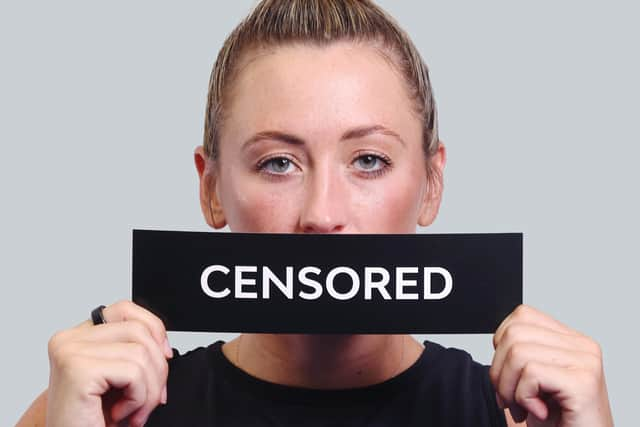Female sports stars join forces to fight against women's online censorship
This article contains affiliate links. We may earn a small commission on items purchased through this article, but that does not affect our editorial judgement.


Former Lionesses Gilly Flaherty and Anita Asante are among the stars urging social media giants to stop censoring vital conversations surrounding women’s health.
The group of sports legends also includes Olympic gold medalist and taekwondo star Jade Jones, Arsenal legend Jen Beattie, Baroness Tanni Grey-Thompson, Olympic gymnast Ellie Downie, triathlete Emma Pallant-Browne, and hurdler Perri Shakes-Drayton.
Advertisement
Hide AdAdvertisement
Hide AdThey are pictured with the word ‘censored’ across their mouths to highlight how women’s health issues are still not openly discussed online.
The powerful images come as part of Bodyform’s ongoing #VaginasUncensored campaign, which aims to normalise language around women’s health, after it was revealed there are 40 words censored across social media including period, menstruation, menopause and miscarriage.
Many of the words have been ‘shadowbanned’ by social media giants, which sees an algorithm deprioritise them, and prevents them from receiving engagement.
Last month, Bodyform was slapped with an ad violation by Meta for featuring the words vaginas and periods in their anti-stigma campaign ad.
Advertisement
Hide AdAs a result, Bodyform held a protest outside Meta offices, which was joined by TV star Cherry Healey, female empowerment organisation 'She Oath', and hoards of women all hoping to stop the censorship online.
Advertisement
Hide Ad

Anita Asante, who earned 71 caps for the Lionesses over her 14-year career, shared a startling incident which exemplifies the need for change.
She said: "I once had to miss a game for the Lionesses due to a very heavy period which is mind-blowing when you think about it.
"As we know women's sport has come a long way but in my opinion there are still basic things that need to improve.
Advertisement
Hide Ad"Social media is an excellent place to discuss female health but to be honest we need to change the way we address women's health both online and offline.”
Former Lioness Gilly Flaherty acknowledges the positive changes that have occurred in sport due to increased openness among women.
Advertisement
Hide AdShe said: "Changes have been made BECAUSE women have become more open.
"Before a game, you'd walk on to the pitch and get your teammates to check you for your period and you'd ask them to tell you if you leaked during the game.
Advertisement
Hide Ad"If we'd had conversations about the colour of our shorts at the start of my career and I'd been able to wear dark shorts instead of white, it would of removed the stress and anxiety, which could have affected my performance.
"And when I first started there weren't as many fans and it wasn't on telly, now you've got millions of viewers and 40,000 to 50,000 fans at Wembley staring at you.
"Social media needs to help us talk more about these issues so we can change and adapt where necessary.”
Advertisement
Hide Ad

Triathlete Emma Pallant-Browne, who was recently snapped competing with a period stain, joined the campaign after trolls targeted her for reposting the image.
Advertisement
Hide AdThe world number seven told how she hopes to change how women communicate health issues online.
She said: “I got questions like ‘why are you putting a picture like that online?’ and ‘that can so easily be cropped out’ but that’s not the reality of life.
“And ironically, by questioning me over my decision to post the image, women were starting to talk about it.
“Social media is such a quick, easy, accessible way for young women to learn and if we use it correctly to share knowledge on vital topics, it can bring so much goodness to people's lives.”
Advertisement
Hide AdAdvertisement
Hide AdThe brand is releasing the images today ahead of the World Cup to encourage women to have open conversations around health issues that affect their everyday lives.
The women, who represent a range of different sports, have come together to use their platforms to speak about their own experiences of censorship to ensure both future athletes and their followers feel empowered to speak about health issues online.
This year marks two major changes in women’s sport, relating to women’s periods.
The Lionesses will be sporting blue shorts in the World Cup after they raised period concerns about their all-white strip, and female tennis players were also given permission to wear dark undershorts this year at Wimbledon.
Advertisement
Hide AdBodyform brand manager Alex Fisher said: “Our long-running anti-stigma campaign aims to help women feel empowered to be themselves in every aspects of their lives.
Advertisement
Hide Ad“When restrictions are in place, it makes women feel shame or embarrassment. We are committed to removing censorship and breaking taboos to help allow women to have vital conversations.
“We want to arm women with all the tools they need to support each other whether it be on the pitch or social media.”


The censorship campaign is also supported by The Eve Appeal, which campaigns for better education surrounding women’s health.
Advertisement
Hide AdAthena Lamnisos, CEO at the charity, said: “Understanding your own body is a fundamental part of being able to look after your health.
“It’s an exceptional time for women’s sport and there has never been a better time to challenge the taboos and shame that exist around our bodies, our anatomy, from periods through to menopause.
Advertisement
Hide Ad“If we want to empower girls of the future to look after themselves, we need to challenge these taboos - one pair of tiny white shorts at a time!"
Dr Bella Smith, NHS GP partner and co-founder of The Well HQ, said: “As a GP I see girls and women of all ages, every day for all their health needs.
Advertisement
Hide Ad“Whether it be physical health, emotional health, mental health or sexual health, these women need to describe to me the symptoms they are experiencing and their concerns in order to reach a diagnosis and the correct management.
“When the correct words to describe women’s health and their anatomy are ‘censored’ then this is putting women at risk by making the subject feel ’shameful’ or ’taboo’.
“Women need to be able to have a voice to discuss these issues safely, openly and honestly without judgement or risk of being censored.”